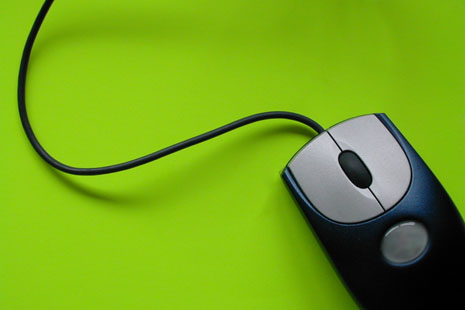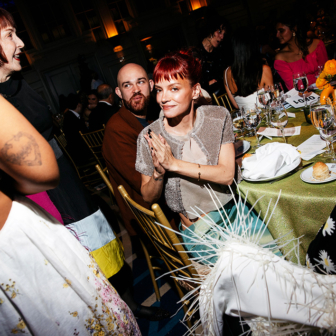JAMMIE THOMAS-RASSET is a brownfields development coordinator for the Mille Lacs band of the Obijwe people in Minnesota, and a mother of four. She has been taken to court twice for sharing twenty-four songs on the peer-to-peer network Kazaa. The songs included Guns N Roses’s “Welcome to the Jungle,” Gloria Estefan’s “Here We Are,” and Sara McLachlan’s “Possession.” Readily available on iTunes for a dollar or so each, these songs and mainstream hits like them are now part of what Wired.com calls the most valuable playlist of the century.
In the first case, a jury found her liable for wilful infringement and awarded damages to the record companies of $US9,250 a song, with a total fine of $222,000. The judge ordered a mistrial. Rather than settle, Ms Thomas-Rasset decided to face a second trial. Her defence changed several times, and her argument that her children might have been responsible for the infringement was not convincing. The second jury again found her liable for damages, this time at the increased rate of $US80,000 a song, for a total bill of $1.92 million.
Ms Thomas-Rasset is one of over thirty thousand individual file sharers the Recording Industry Association of America has sued for infringement of copyright, reportedly generating over $US100 million in settlements. So far only this one case has gone to trial, with such a crushing victory for the RIAA that it casts into doubt the whole strategy of suing individual file-sharers.
The RIAA has again offered to settle with Ms Thomas-Rasset. In a statement that may prove an apt metaphor for the entire strategy of suing individual infringers, Ms Thomas-Rasset has described the chances of extracting the damages from her as “like squeezing blood from a turnip.” While $1.92 million is an extraordinary penalty for sharing a couple of CDs’ worth of music, the amount awarded was in the middle of the statutory range, which was increased from $750 to $150,000 for each infringement after amendments to the US Copyright Act. These amendments were intended, it was said, to bring the law into line with the realities of the digital age. The thinking behind the $80,000 figure, just as for the $9250, is completely mysterious.
Downloading a song, movie or TV show from BitTorrent without paying for it is an everyday act of exchange in internet culture. It is one of the many kinds of contact internet users continually have with copyright material, and it will usually infringe someone’s copyright. Making that song available to others by uploading it will be a further infringement, and these acts clearly have some potential to damage the owner’s economic rights. The strongest message from the copyright industries, and from governments, is that these acts are kinds of stealing. The idea is that while the contravention of a “statutory economic right” may be an abstruse and complex wrong, people should agree that stealing is a bad thing, whether or not it is easy to do, and whether or not there is much chance of being caught, despite the unfortunate experience of Jammie Thomas-Rasset.
The difficulty with the idea of stealing is that it implies taking possession of an object, and in the case of something like music it is not clear what this object is. Stealing is also, generally, a criminal offence, although most copyright actions are civil matters. The British government’s recent report, Digital Britain, asserts that “Unlawful downloading or uploading, whether via peer-to-peer sites or other means, is effectively a civil form of theft.” But making a digital copy of something doesn’t stop anyone else from enjoying the work, whether they pay for it or not. It doesn’t deprive the owner of their work, even temporarily. And far from being a departure from our pre-internet patterns of consumption, the act of not paying for music or TV is familiar for all of us, because we’ve learnt to rely on remarkably contrived and indirect systems of paying for these things on broadcast media, through advertising or taxation. So a direct translation of the idea of stealing from tangible goods to a digital network is fraught. And the idea of “digital piracy,” with its suggestion of profiteering from trade in stolen items, has proved not so much scary as enticing, at least enough to excite a wave of “pirate parties” devoted to digital liberty in Europe. The recent European elections returned one representative of the Swedish Pirate Party, riding on the back of the prosecution of a prominent Bit Torrent website there.
Real enthusiasm for piracy, like the anti-capitalist “culture-jamming” celebrated by critics such as the Canadian writer Michael Strangelove, is likely to remain on the techno-political fringe. The mainstream downloaders are more of a worry for the record industry. There is some evidence that downloading may now be considered a standard form of internet behaviour – an accepted and widely adopted practice, if perhaps not one people are always comfortable with. In this ethos, the question of whether it is wrong to download something is not determined by strong beliefs about “property” in general. The issue is likely to be contextual – “it depends” – rather than clear-cut. It might depend on how easy it may be to acquire a copy legitimately, or whether a listener wants to try something they are curious about.
The Oxford Internet Institute’s 2009 survey made some interesting findings on this topic. It reports that in Britain non-users and ex-users of the internet are notably more critical than users of activities such as downloading music without paying for it. In a similar study conducted in Australia in 2007, we asked internet users how much they would be prepared to pay for an online version of a $40 CD or DVD. The answers were not encouraging for traditional audiovisual businesses: over 50 per cent said they would not pay any amount, and 27 per cent said they would pay only up to $20.
If governments are determined to tackle downloading as a form of “civil theft,” we should be as clear as we can about what is being stolen, and what its value is. One striking aspect of the debate over new anti-digital piracy laws is the lack of credible evidence as to what downloading actually costs copyright owners. A succession of industry-funded reports has made highly publicised claims that vast sums have been lost to piracy. Many of these studies appear to be based on questionable extrapolations of consumer behaviour, and assumptions that downloaded copies can be directly translated into sales foregone. Yes, downloading is increasing and recorded music industry revenues are declining. But is there a causal link between the two, and if so is it important? Ben Goldacre, author of Bad Science, drily observes that if the latest estimates of the costs of piracy in the UK were to be believed, then this activity alone would have cost the UK 10 per cent of its GDP in 2008. Things are bad, but not quite that bad.
The Guardian’s Charles Arthur has made the sensible suggestion that downloads need not be seen as “lost sales.” A more sensible starting point would be to consider what people are spending money on, assuming that they will probably continue, more or less, to devote a reasonably stable portion of their disposable cash to entertainment. If they’re not spending it on music, they’re likely to have spent it on something else, like video games or DVDs. Sales of both of these have increased dramatically over the last decade, in sync with the startling decline of the CD. If this is where the important causation really lies, the sales have been lost not to downloads but to other, more popular, forms of personal entertainment which have emerged fairly recently. The problem may not be the net so much as broader trends towards more immersive, less casual, forms of audiovisual leisure.
This line of reasoning connects with some older (and much criticised) American research, conducted in the early 2000s in response to a wave of anxiety over then-popular file sharing systems such as Morpheus and Kazaa. Using data from those file sharing networks, researchers from Harvard Business School and the University of North Carolina found almost no connection between the sharing of particular music online and sales of CDs.
AFTER A DECADE of litigation and bitter debate, the problem of internet piracy appears to be looming larger than ever for governments and industry. If suing individuals is no better than suing turnips, the issue turns to those other parties involved in the whole downloading business. Those who market the offending software have been targeted in a series of cases, such as the prosecution of Kazaa in Australia, and the US cases against Napster, YouTube and Gnutella. Despite legal victories, these cases have in fact had mixed results. Although some parties, such as YouTube, have been drawn into negotiation with copyright holders, the effect of other decisions seems to have been to encourage the evolution of infringing file sharing at least as much as its substitution by legal means. Napster invented easy-to-use, peer-to-peer music distribution back in the last century, but from today’s perspective it was a remarkably centralised system of managing the flow of content across users’ machines. BitTorrent, the most widely used peer-to-peer system today, is much more dispersed, leaving copyright owners with the less satisfactory option of attacking websites such as the Pirate Bay, which hosts small files that point to files spread across the net.
The next port of call are the internet service providers, or ISPs, who connect downloaders with the file sharing networks, and profit from that link. More importantly, ISPs record and store critical information about the actions of their users: which websites they visit, and what files they download. An industry group, the Australian Federation Against Copyright Theft, together with a group of broadcasters and others, is now suing a small Western Australian ISP, iiNet, in the Federal Court. The claim is that iiNet in effect authorised its customers to engage in downloading copyright materials. But the real issue in this case is probably the capacity of ISPs to protect themselves from liability for their customers’ actions, using “safe harbour” provisions in the law which offer immunity from damages. Copyright owners would like ISPs to notify them and disclose information about infringements; they would like ISPs to do the dirty work, by taking responsibility for dealing with infringing users. All this, of course, would place the ISPs in a new and difficult role.
A new generation of official thinking about the internet is now appearing around the world, driven by the promise of fast broadband and the continuing evolution of online applications and services. In Australia, the United States and Britain, centre-left governments are making the case for substantial new investments in infrastructure, and once again extolling the educational, social and economic potential of public networks. The British government’s Digital Britain report reveals one fish in a school of new, would-be digital nations. But as we’ve seen in Australia, the twenty-first century’s official image of the internet, like the nineteenth century’s image of the city, is always a picture of light and shadows. The case in favour of spending money on broadband and the good things must then be coupled with the appearance of decisive action dealing with the nasty things. The idea that ISPs should monitor, report and if necessary disconnect errant customers might be part of the new deal: on the other hand it may unravel into yet another of the unworkable, symbolic and apparently necessary futilities that characterise the long war against digital piracy.
Meanwhile, a second case against an individual file-sharer is underway in the United States, and it is developing into even more of a spectacle than the first. Graduate student Joel Tenenbaum is being sued for sharing seven songs. Charles Nesson, a distinguished professor in internet law from Harvard, is leading the defence, along with a team of his students. Their case has now left behind Jammie Thomas-Rasset and her fumbling, final attempts to shift responsibility to her children. For them, as for the RIAA, the case is now about something much bigger than a copyright infringement. It is about establishing the right to share as a new form of fair use, attuned to contemporary online culture. The defence argues that the record company’s suit is an attempt to scare parents and teachers away from computers, the internet, and their promise of freedom. As his motion to dismiss declares, “Joel Tenenbaum was a teenager at the time of the alleged copyright infringements, in every way representative of his born-digital generation.” •




